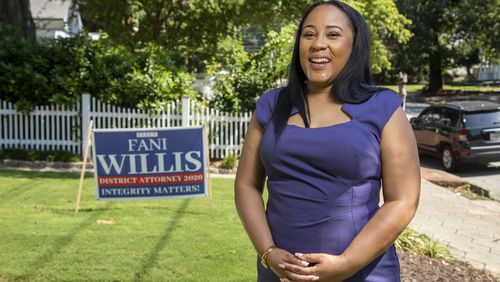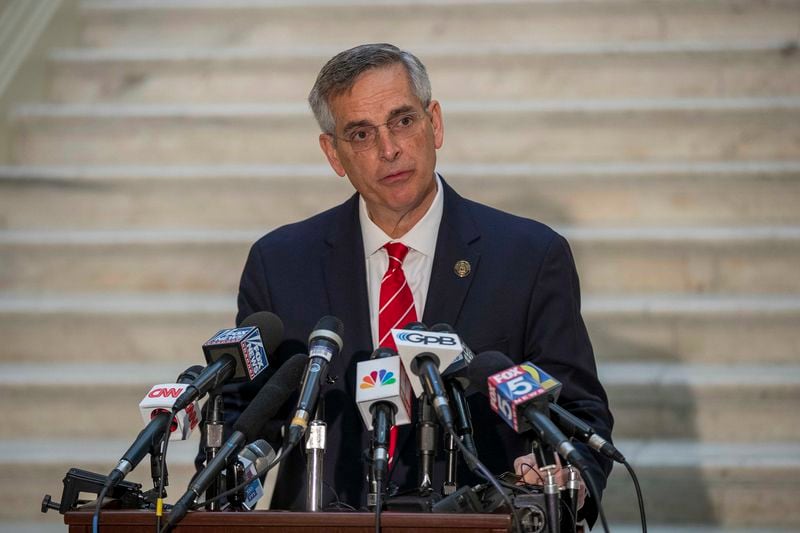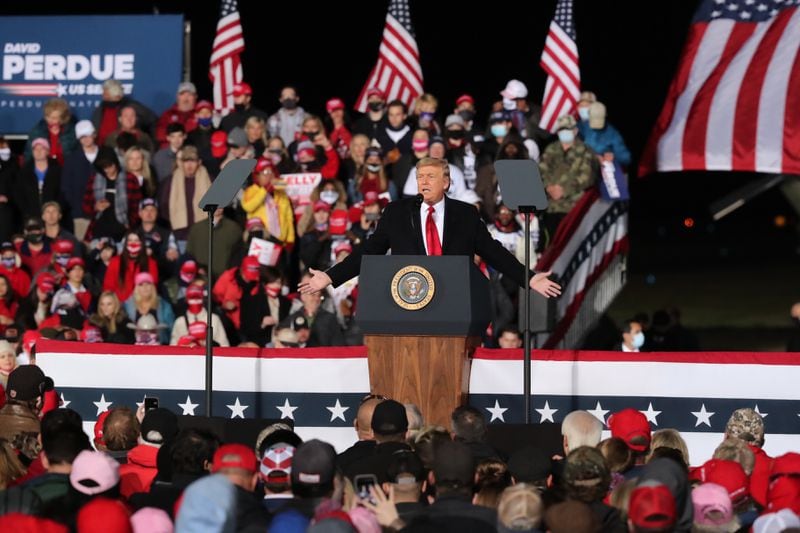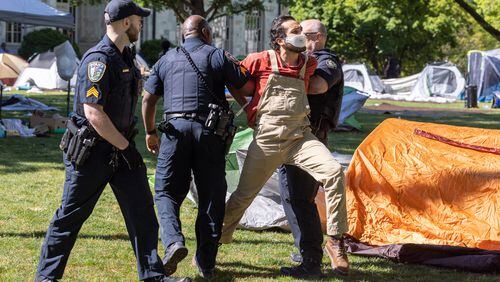As U.S. House managers made their case for the impeachment of Donald Trump, Fulton County’s top prosecutor on Wednesday launched a wide-ranging criminal investigation into the former president.
The investigation by District Attorney Fani Willis, a Democrat entering her second month in office, centers on a Jan. 2 phone call to Georgia’s Secretary of State Brad Raffensperger in which Trump pleaded with him to “find” enough votes to overturn his narrow defeat in the state.
“This letter is notice that the Fulton County District Attorney has opened an investigation into attempts to influence the administration of the 2020 Georgia General Election,” Willis wrote in correspondences delivered Wednesday morning to Raffensperger, Gov. Brian Kemp, Lt. Gov. Geoff Duncan and Attorney General Chris Carr.
Willis told The Atlanta Journal-Constitution on Wednesday that her office was best suited to handle the investigation since all other relevant state investigative agencies have conflicts. In her letter, Willis said her office “is the one agency with jurisdiction that is not a witness to the conduct that is the subject of the investigation.”
“I don’t have any predetermined opinions” about whether a prosecution will even occur, she said. Willis would not say whether anyone else besides the former president is under investigation.
The veteran prosecutor, who ousted her former boss, Paul Howard, in last year’s Democratic primary, urged the officials to preserve documents related to Trump’s efforts to reverse the outcome of Georgia’s election.
“This investigation includes, but is not limited to, potential violations of Georgia law prohibiting the solicitation of election fraud, the making of false statements to state and local governmental bodies, conspiracy, racketeering, violation of oath of office and any involvement in violence or threats related to the election’s administration,” Willis wrote.
Calling it a “matter of high priority,” Willis said the next Fulton County grand jury is set to convene in March and added “this office will begin requesting grand jury subpoenas as necessary at that time.” She said investigators have no “reason to believe that any Georgia official is a target of this investigation.”
The Jan. 2 call with Raffensperger factors directly into the second impeachment trial of Trump that began this week in the U.S. Senate. House impeachment managers allege that Trump’s attempts to undermine the vote in Georgia showed his willingness to incite an insurrection and spurred a mob to attack the U.S. Capitol days later.
The former president’s call to Raffensperger was just one part of his efforts to undo his narrow election defeat in Georgia, which Democrats captured in a White House vote for the first time since 1992.
He repeatedly urged Kemp to call a special session to overturn his defeat, pressed then-U.S. Sens. Kelly Loeffler and David Perdue to block the Electoral College certification of Joe Biden’s victory in Congress and urged a state investigator to find fraud during a count of absentee ballots. He also trumpeted state legislators who demanded Kemp take more action to overturn the results.
Kemp and Raffensperger, along with other top state officials, consistently pushed back on Trump’s attempts and said there was no evidence of widespread voter fraud. Courts at every level have dismissed challenges by Trump and his allies seeking to overturn the election results.
Credit: TNS
Credit: TNS
Separately, Raffensperger’s office opened an investigation Monday into Trump’s call. The investigation was prompted by a complaint from George Washington University law professor John Banzhaf III, according to a case initiation document. In an interview earlier this month with ABC News, Raffensperger said the Fulton DA’s office would be the “appropriate venue” for a criminal probe.
Fulton County was also the scene of much of the election fraud that was alleged, but never proven, to have taken place in Georgia by Trump and his supporters. In his call to Raffensperger, Trump claimed “anywhere from 250 (thousand) to 300,000 ballots were dropped mysteriously into the rolls, much of that had to do with Fulton County, which hadn’t been checked.”
In fact, there was no mystery. Most of those ballots were mailed in and counted after those cast on Election Day, as had been expected and widely reported.
Trump also claimed “hundreds of thousands” of signatures on Fulton County ballots were forged. But that would be impossible, since only 147,000 ballots were mailed in Georgia’s largest county, a reliable bastion for Democratic votes. And a claim that a Fulton election worker fed ballots through a tabulating machine three times was debunked by multiple recounts, including one by hand, that showed no discrepancy among the ballots.
“We did an audit of that,” Raffensperger told Trump. “It was proved conclusively that they were not scanned three times.”
Legal opinions were mixed as to whether Trump’s behavior rose to the level of criminality.
“The vitriolics and the blustering — I hate to say we’ve gotten used to it, but we’ve come to expect it,” Atlanta lawyer Lee Parks, who has represented Republicans in several election-law cases, told the AJC in January. “I think you just take a deep breath. We’re sad it happened and embarrassed that it came from the president. But I don’t think there is civil or criminal liability.”
And, as Parks noted, Trump ultimately didn’t get what he wanted.
But Bennett L. Gershman, a law professor at Pace University, said Willis is duty-bound to investigate possible criminal conduct in her jurisdiction. State and local prosecutors in New York are also investigating the former president concerning allegations of financial improprieties involving the Trump Organization.
The case in Fulton County may be stronger, Gershman said Wednesday, due to the presence of an audiotape of the call to Raffensperger.
“I think there’s a decent chance we’ll see criminal charges,” he said. “These are serious allegations.”
Credit: Curtis Compton / curtis.compton@ajc.com
Credit: Curtis Compton / curtis.compton@ajc.com
Anthony Kreis, a constitutional law professor at Georgia State University, said Trump “wanted to use his position of influence and authority to alter official election results.”
Kreis said more recent evidence that Trump was threatening Kemp and other state officials for “failing to do his bidding” could also shape the investigation.
“The Fulton County investigation will place the phone call into a larger context to suss out Trump’s intent, which I think has generally shown that Trump knew or should have known what the truth was — but that he continued to ply undue pressure on Georgia officials anyway,” Kreis said.
In her letter, Willis said she is looking into those possible “threats related to the election’s administration,” a reference to a false claim Trump made that the secretary of state could face criminal charges if he didn’t investigate the case to the president’s satisfaction.
The call to Raffensperger, first reported by The Washington Post and the AJC, quickly yielded sharp fallout on the campaign trail and came days before the Democratic sweep of the state’s Jan. 5 runoffs that flipped control of the U.S Senate.
Watchdog groups who had urged Willis to seek criminal charges applauded her decision on Wednesday.
“Trump’s conduct violates not only the law, but the foundation on which our democracy is built,” said Noah Bookbinder of the Citizens for Responsibility and Ethics in Washington. “He may have been able to evade facing criminal charges as president, but he is no longer president.”
If Willis brings charges, Trump has no legal immunity. He’ll have to stand trial just like any other citizen, stripped of the protections of his former office.
That sets up the very real possibility that a former president of the United States will be prosecuted by a first-term district attorney — another precedent, Gershman said, for a president who disdains them.
Asked to respond to critics who accuse her of being a political opportunist, Willis said she is already occupying her dream job.
“I’m not trying to make a name for myself,” she said.











